Dan Brown's
Inferno
No. 1 bestseller.
Purgatorio ("Purgatory" in English) is the second section of The Divine Comedy, which is an epic poem written by the great Italian poet, Dante Alighieri. It follows after his journey through the 9 Circles of Hell in the first section, Inferno. In Purgatorio, Dante ascends Mount Purgatory, guided by Roman poet Virgil. The climb is meant to teach Dante important lessons about Christian virtue and God's love, cleansing him of his sins in preparation for his eventual journey toward God.
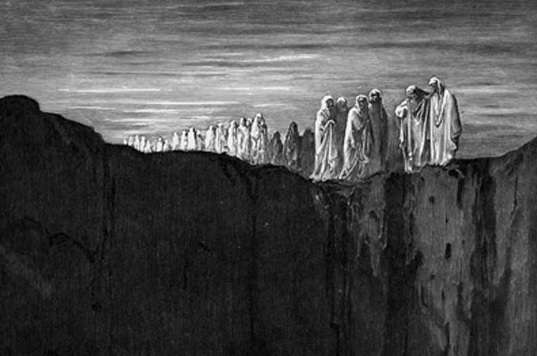
This stage is at the very base of the mountain and is part of what is known as Ante-Purgatory. Here, the two poets encounter the souls of those who delayed their commitment to Christian life due to their stubborn refusal to follow God's laws. These souls must remain in Ante-Purgatory for a period thirty times longer than the time they spent in resistance. Among them, the poets meet Manfred of Sicily, who explains that a soul's time in Purgatory can be reduced with prayers of devout Christians still living on Earth.
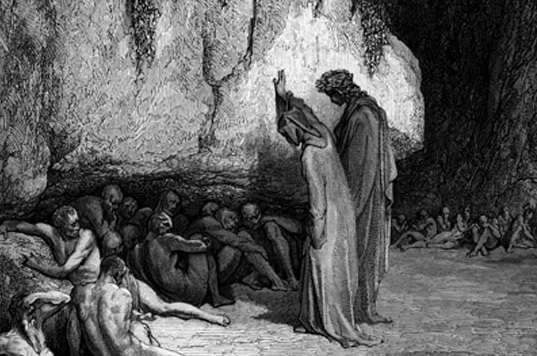
The second and last part of Ante-Purgatory. Here, Dante encounters the souls of deceased kings who were negligent in their duties, people who never repented while alive, and those who suffered violent deaths but managed to repent in their final moments. That evening, Dante falls asleep and dreams of being carried by an eagle, only to awaken at the entrance to Purgatory Proper. At the gate, an angel carves the letter "P" on Dante's forehead seven times, symbolizing the seven deadly sins. The angel explains that as Dante ascends Mount Purgatory, progressing through each terrace (one for each sin), a "P" will be removed. The angel then opens the gates, allowing Dante to begin his journey.

The first terrace is filled with souls who were prideful in their earthly lives. The terrace walls are decorated with sculptures that depict scenes of humility, which is the opposite of pride. However, the prideful never get a chance to see these sculptures, as they are forced to carry immense weights on their backs, which bends them forward as a form of penance. Dante bends down to speak with these souls, learning valuable lessons from them as they seek to purge their sin. When Dante reaches the exit of the terrace, an angel removes the first "P" from his forehead, symbolizing the removal of his first sin, and the poets proceed to the second terrace.

This terrace is filled with the souls of envious penitents. In life, they were consumed by jealousy, longing for the happiness or success of others—even to the point of causing harm to deprive others of their joy. As they enter the terrace, they hear voices that speak examples of generosity, which is the opposite of envy, encouraging them to reflect on selflessness. Later, they hear examples of envy to remind them of the harm it caused. The penitents wear gray cloaks, and their eyes are sewn shut with iron wire, blinding them as part of their penance. When they leave the terrace, the second "P" is removed from Dante's forehead.
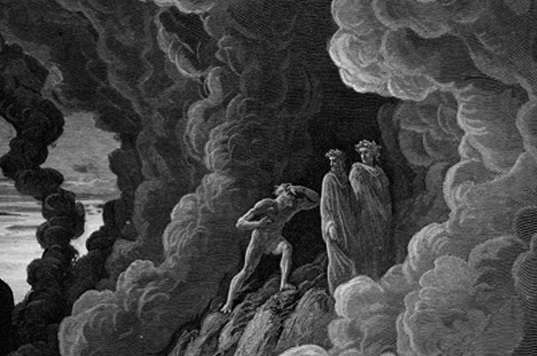
Next, the poets enter the third terrace, which is filled with souls of wrathful penitents. Dante begins to have visions of gentleness, symbolizing the virtue that opposes wrath. The wrathful souls are enveloped in a dense cloud of black smoke, representing the anger that once clouded their minds and blinded them in life. The souls in this part of the poem do not shout out any examples, but Dante engages in a conversation with Marco Lombardo about the nature of free will. He also has visions illustrating the consequences of wrath. When they encounter an angel, another "P" is removed from Dante’s forehead, and he and Virgil continue to the next terrace.

The next terrace holds the souls of those who were slothful during their earthly lives. Virgil explains to Dante that the structure of Purgatory is ordered by types of love. The slothful are forever preoccupied with running around the terrace without rest, since they lacked zeal (the opposite of sloth) in their lives, especially in matters of love and duty. The voices heard in the air offer examples of zeal, inspiring the souls to reflect on their past shortcomings. That evening, Dante falls asleep and is haunted by nightmares of a siren, symbolizing gluttony, lust, and greed. The following day, the fourth "P" is removed from Dante's forehead, and he and Virgil move to the next terrace.
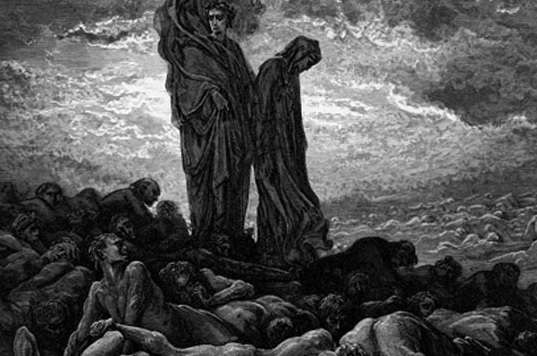
Dante and Virgil enter the terrace of the Avaricious and the Prodigal, where souls are punished for their excessive desire for wealth, whether through greed or wastefulness. The souls lie face down on the ground, their hands and feet bound, symbolizing their need to be purged of earthly attachments. As the poets move through the terrace, a sudden tremor shakes the ground. Although Dante is curious, he refrains from asking Virgil about it. They soon encounter the Roman poet Statius, who reveals that the tremor occurs when a soul is ready to ascend from Purgatory. In this case, the tremor was caused by Statius himself, who is now free to continue his journey. Statius, a devoted admirer of Virgil’s work, joins them. Before moving on, Dante encounters an angel who removes the fifth "P" from his forehead.
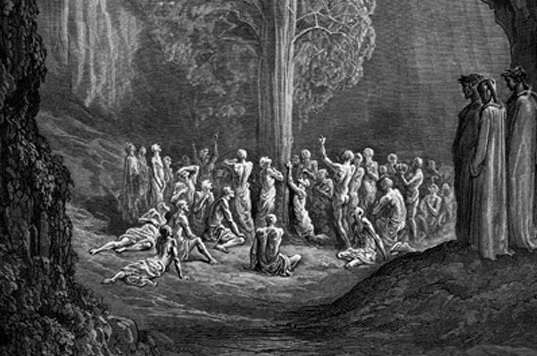
The next terrace holds the souls of the gluttonous, suffering a punishment meant to mirror their earthly indulgence: they are tormented by intense hunger and thirst, surrounded by trees bearing fruit that they can see but never reach. Voices from within the trees offer examples of temperance, which is the opposite of gluttony. Here, Dante encounters his friend Forese Donati and the poet Bonagiunta Orbicciani, who praises Dante's work, La Vita Nuova. As they leave the sixth terrace, an angel removes the sixth "P" from Dante’s forehead.
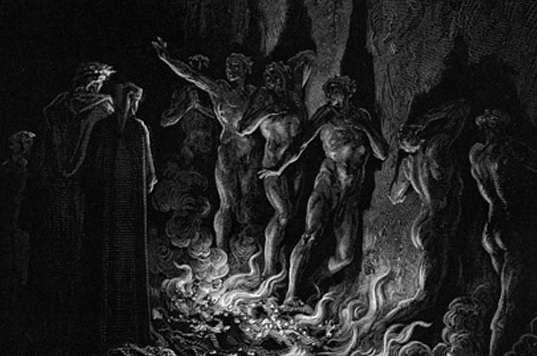
As they continue ascending Mount Purgatory, Dante contemplates how the souls in the terrace of the Gluttonous can be so thin while being spirits. Statius takes this moment, with Virgil's encouragement, to explain the relationship between body and soul. Later, in the terrace of the Lustful, the penitent souls must pass through a towering wall of flames, calling out examples of chastity—the virtue opposing lust—as they run. This trial is mandatory for everyone, including Dante. Hesitant and fearful of the flames, Dante is reassured by Virgil, who reminds him that Beatrice, the love of his life, awaits him in the Earthly Paradise. This assurance strengthens Dante's resolve, and he passes through the flames. Afterward, they all fall asleep, and upon waking, proceed to the Earthly Paradise, where the final "P" marking sin is lifted from Dante's forehead.